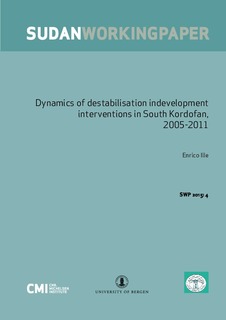Dynamics of destabilisation in development interventions in South Kordofan, 2005-2011
Working paper

Permanent lenke
http://hdl.handle.net/11250/2475045Utgivelsesdato
2015-05-19Metadata
Vis full innførselSamlinger
- Publications [1488]
Originalversjon
Bergen: Chr. Michelsen Institute (Sudan Working Paper no. SWP 2015:4) 34 p.Sammendrag
This paper outlines the landscape of development interventions in South Kordofan between the signing of the Comprehensive Peace Agreement (CPA) in 2005 and the start of a new war in June 2011. Given the constant political volatility during this period and the resurgence of violent political contest, the study traces the conditions under which such interventions took place. It analyses the impact of the political context, but also looks at how the interventions related to this context during planning, implementation and evaluation. As a case study, IFAD’s South Kordofan Rural Development Programme is followed into the area in and around Heiban, a rural centre in the central Nuba Mountains, where it was supposed to extend a system of community development committees linked to public administration. The study’s perspective on actors involved in the programme to a variable extent shows not only the complexity of social relations it was interwoven with, but also how this and similar interventions emerged on the ground as part of a plurality of social institutions and organisational structures, in spite of their design as singular contribution to a given situation. Reading context and case study together, the paper argues that any evaluation of development interventions and their consequences in a region like South Kordofan fails to be adequate, if political accountability and political legitimacy are left out or marginalized in the analysis. Instead of being approached as an isolated interaction with ‘local communities’, specifi c conditions of gaining infl uence have to be understood, if a substantial contribution is expected to be made.